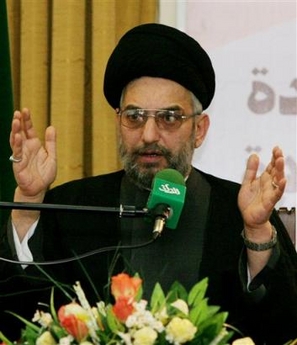|
Shiite leader says he wants federal region
(AP)
Updated: 2005-11-22 09:08
A leading Shiite lawmaker suggested Monday that he will pursue a federal
region in southern Iraq after next month's elections, pushing forward demands
for Shiite autonomy that Sunni leaders fear could tear the country apart.
"We have major missions ahead," Abdul-Aziz al-Hakim, who heads the largest
bloc in the interim parliament, told a gathering of tribal leaders. "The central
and southern regions should be achieved after the elections" set for Dec. 15.

Abdul-Aziz al-Hakim, who heads the largest
block in the interim parliament, delivers his address to tribal leaders
during a reception in his Baghdad home, Iraq, Monday, Nov. 21, 2005.
[AP] | According to Iraq's new constitution, the
country's 18 provinces — except for Baghdad — can combine to create self-ruled
areas. Kurds have such a region in the north and Sunni Arabs fear that a similar
Shiite-run mini-state in the south would deprive them of a share of the nation's
oil wealth — concentrated in those two areas.
Sunni Arabs also fear the system would tear the country apart.
Al-Hakim also played down the discovery of an Interior Ministry detention
facility last week by U.S. troops where 173 detainees, some malnourished and
apparently tortured, were held.
"Loud noises are being made on purpose about the Jadriyah prison by some
terrorist groups. The (interior) minister made it clear that this prison is one
of several detention centers and it is not a secret location," al-Hakim said.
"If there were violations we will not accept them. The investigation is going
on."
Interior Minister Bayan Jabr is a member of the Supreme Council for the
Islamic Revolution in Iraq, a political party that al-Hakim heads.
Al-Hakim also stressed the importance of December's elections, which will
create a permanent government for the next four years.
"We have reached the last point in the (transitional) political stations.
There are three weeks and elections will be held," al-Hakim said. "This will be
historic moment concerning our future which should be in safe
hands."
|